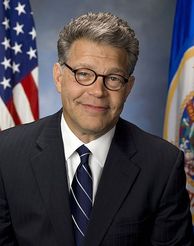Buyer’s Remorse? Franken Loss Would Make History in Minnesota
Minnesotans have never flipped a U.S. Senate seat in back-to-back-to-back elections

Franken’s seat currently sits on the ‘watch list’ of D.C. prognosticators Charlie Cook and Larry Sabato – both identifying the race as a ‘likely’ hold for Franken, with the caveat that the race may yet become competitive.
Such caution seems validated in light of a new St. Cloud State University poll that was released on Wednesday, which shows Franken receiving a job approval rating of just 39 percent among his constituents – 18 points behind the state’s senior delegation member Amy Klobuchar at 57 percent.
Fifty-one percent of Gopher State residents rated Franken’s job performance negatively.
(The only bright spot of the St. Cloud State poll for the Franken campaign is that the survey was conducted of adults, not likely voters).
If a strong Republican candidate emerges out of its nomination process in 2014, Franken and the Gopher State could once again be faced with the possibility of turnover in its Class II U.S. Senate seat.
Sixteen different Minnesotans have held this seat during the direct election era dating back 100 years ago.
That compares to just 10 men and women who have held the Class I seat currently occupied by Klobuchar.
A Franken loss would also mean party control of the seat will have flipped in three consecutive general elections – a feat that has never happened in the history of Minnesota.
In fact, the Gopher State has flipped partisan control of one of its U.S. Senate seats in back-to-back cycles only twice since statehood – with both beginning with the death of a multi-term sitting senator.
The first case occurred after Republican Knute Nelson was elected to his fifth and final term in 1918.
Nelson died in office in 1923 and a special election held later that year sent Farmer-Laborite Magnus Johnson to D.C.
Johnson would then lose his seat in 1924 when Republican Thomas Schall won the next general election.
The only other instance came after the election of DFLer Paul Wellstone in 1996, who died six years later just a few weeks before Election Day.
Republican Norm Coleman was subsequently elected in 2002 only to be defeated by Franken in 2008 after a recount and prolonged court challenge.
(Note: In November 1936, Minnesotans simultaneously elected Republican Guy Howard in a special election and Farmer-Laborite Ernest Lundeen in the general election after the death of Republican Thomas Schall. After Lundeen’s death Republicans Arthur Nelson and Joseph Ball were simultaneously elected in 1942 special and general elections respectively).
This general partisan stability in Minnesota’s U.S. Senate seats has occurred even though just 12 of the 21 men and women elected to the chamber in the direct election era won a second term.
Winners of a second term are Republicans Knute Nelson, Thomas Schall, Edward Thye, David Durenberger, and Rudy Boschwitz, Farmer-Laborite turned Republican Henrik Shipstead, and DFLers Hubert Humphrey (twice, once to each seat), Eugene McCarthy, Walter Mondale, Paul Wellstone, and Amy Klobuchar.
U.S. Senators elected to only one term in the direct election era are Republicans Frank Kellogg, Guy Howard, Arthur Nelson, Joseph Ball, Rod Grams, and Norm Coleman, Farmer-Laborites Magnus Johnson and Ernest Lundeen, and DFLer Mark Dayton.
Put another way, slightly more than two-thirds of Minnesota U.S. Senators who sought a second term from their seat were victorious over the last century, or 11 of 16.
However, four of these five U.S. Senators who lost their bid for a second term won their seat in the first instance with only a plurality of the vote – like Franken in 2008 (42.0 percent): Kellogg in 1916 (48.6 percent), Ball in 1942 (47.0 percent), Grams in 1994 (49.1 percent), and Coleman in 2002 (49.5 percent).
Among the Republicans currently vying for their party’s nomination are State Senator Julianne Ortman, State Representative Jim Abeler, St. Louis County Commissioner Chris Dahlberg, businessman Mike McFadden, bison farmer Monti Moreno, and frequent candidate and retired U.S. Army chaplain Harold Shudlick.
Follow Smart Politics on Twitter.
